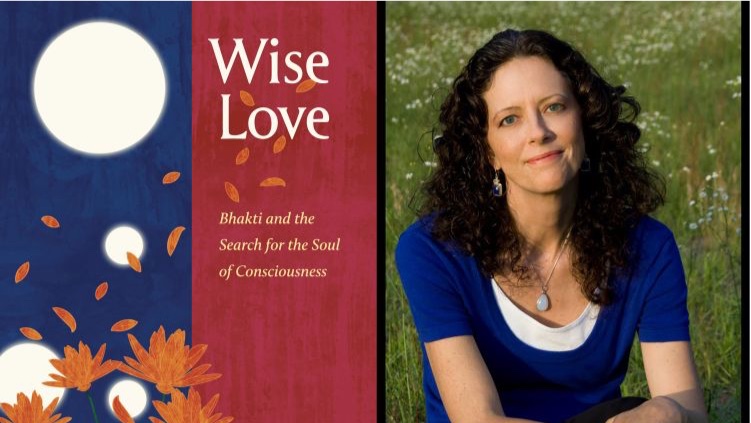New Book “Wise-Love” Boils Down Essence of Bhakti for a Modern Audience
By Madhava Smullen | Mar 30, 2018

Wise-Love: Bhakti and the Search for the Soul of Consciousness, a book by Pranada Dasi, has hit the Amazon Hot New Releases list at number one in Indian Eastern Philosophy.
Currently available for pre-order and out on March 31st, it is a handbook of the essence of bhakti written for a modern, Western audience. It’s also free of dogma, sectarianism and internal ISKCON lingo; and the first book of its kind written by a woman.
Pranada, a disciple of Srila Prabhupada, former BBT manager and activist for women’s spiritual empowerment, took three years to write the book. But she began the groundwork for it in 2010 when she started a blog to practice speaking to a broader audience beyond ISKCON.
Removing the ISKCON-isms from her vocabulary and replacing them with accurate alternatives was a challenge, she says. But she succeeded in developing her own terms to describe complex philosophical concepts.
“Wise-love is the term I use for bhakti,” she explains. “Bhakti means love that’s grounded in reason and philosophy, and an ancient system for cultivating that love.”
The essential theme of Pranada’s book is love – how our current experience of love is unsatisfying, because we lack wise-love, unconditional and grounded in a relationship with the Supreme Person.
“If we just understand that, and engage with the practice of wise-love, then love in this world takes on meaning, form and beauty,” she says.
A concise introduction to bhakti, Wise-Love is arranged in seven sections titled after different phases of the moon, that cover different levels of self-realization.
In the first section, “Rising Consciousness,” Pranada describes who the self is. We, as individuals with feelings, are experiencing consciousness, she explains. That consciousness has an intrinsic nature – sat-cit-ananda in Sanskrit – which she terms “being, knowing, and loving.” She also explains the difference between the brain, the mind and consciousness.
In the second section of the book, “Peering Over the Horizon,” Pranada talks about Karma and faith.
In the third, she contrasts bhakti with jnana – the goal of one is a relationship with the Supreme Person, while the goal of the other is merging into oneness with the impersonal. In the chapter “The Yoga of Love,” she also gives a full definition of Bhakti according to Rupa Goswami’s Bhakti-Rasamrita Sindhu.
Because hearing and chanting are the main tennets of bhakti, the fourth section of the book then explains sacred sound, mantra, the theology of the Holy Name, and prem kirtan (kirtan with a pure focus on the Supreme Person). Sri Chaitanya Mahaprabhu, who popularized these practices in the 15th century, is also introduced in a chapter entitled “Bhakti Revivalist Ecstatic Mystic.”
In the fifth section, Pranada talks about bhakti principals in chapters such as “The Culture of Giving,” “Love’s Morals,” “Humility,” and “Compassion’s Play on Love’s Scale,” where she emphasizes how crucial vegetarianism is to the bhakti path.
The sixth section, “Waterfall of Moonbeams,” touches on how conducive a guru is to the path. In the chapter “Lifestyle of the Bhakta,” Pranada shows what a day might look like for someone interested in bhakti. And in the chapter “Two Inches,” she retells the pastime of Lord Damodar as an analogy, saying that there are two inches between us and the Supreme – our effort, and His mercy.
To make Wise-Love broad and accessible, Pranada does not even mention Krishna’s name until much later. But once the philosophical basis has been established, the final section, Full Orb of Consciousness, guides the reader into a description of Krishna’s personal form, our relationship with Him, and the spiritual world.
As Pranada describes it in her promotional copy, “Wise-Love offers a map for the journey to our home of eternal affection, where a porch light is always lovingly lit, and a warm embrace from our Divine Other awaits.”
Because Wise-Love is a straightforward, concise presentation of the very essence of the bhakti path, without dogma or institutionalism, Pranada hopes it will be helpful to a wide variety of people.
These include those who’ve heard about bhakti but don’t know what it actually is; yogis who are interested in the philosophy of yoga; seekers attracted to Eastern thought; friends, acquaintances, and family members of ISKCON devotees who want to understand where they’re coming from; and new devotees.
It may even be valuable to second generation devotees and others who find it hard to access Srila Prabhupada’s vast literary contribution and need an entry point.
“I hope that people who have heard about terms like bhakti and bhava, but never got a full overview of their meaning, will be able to read Wise-Love and see that bhakti is an authentic yoga tradition with a serious backing of not only philosophy, but of seers, saints, and mystics, carrying it forward to the modern day,” Pranada says. “And that by taking it up, one can have a genuine spiritual experience of one’s self, and our Divine Friend.”
* * *
Click here to purchase a copy of Wise-Love: https://www.amazon.com/Wise-Love-Bhakti-Search-Soul-Consciousness/dp/099966543X/ref=sr_1_1?ie=UTF8&qid=1517174557&sr=8-1&keywords=wise+love+bhakti
For more information visit: http://www.pranadacomtois.com/












